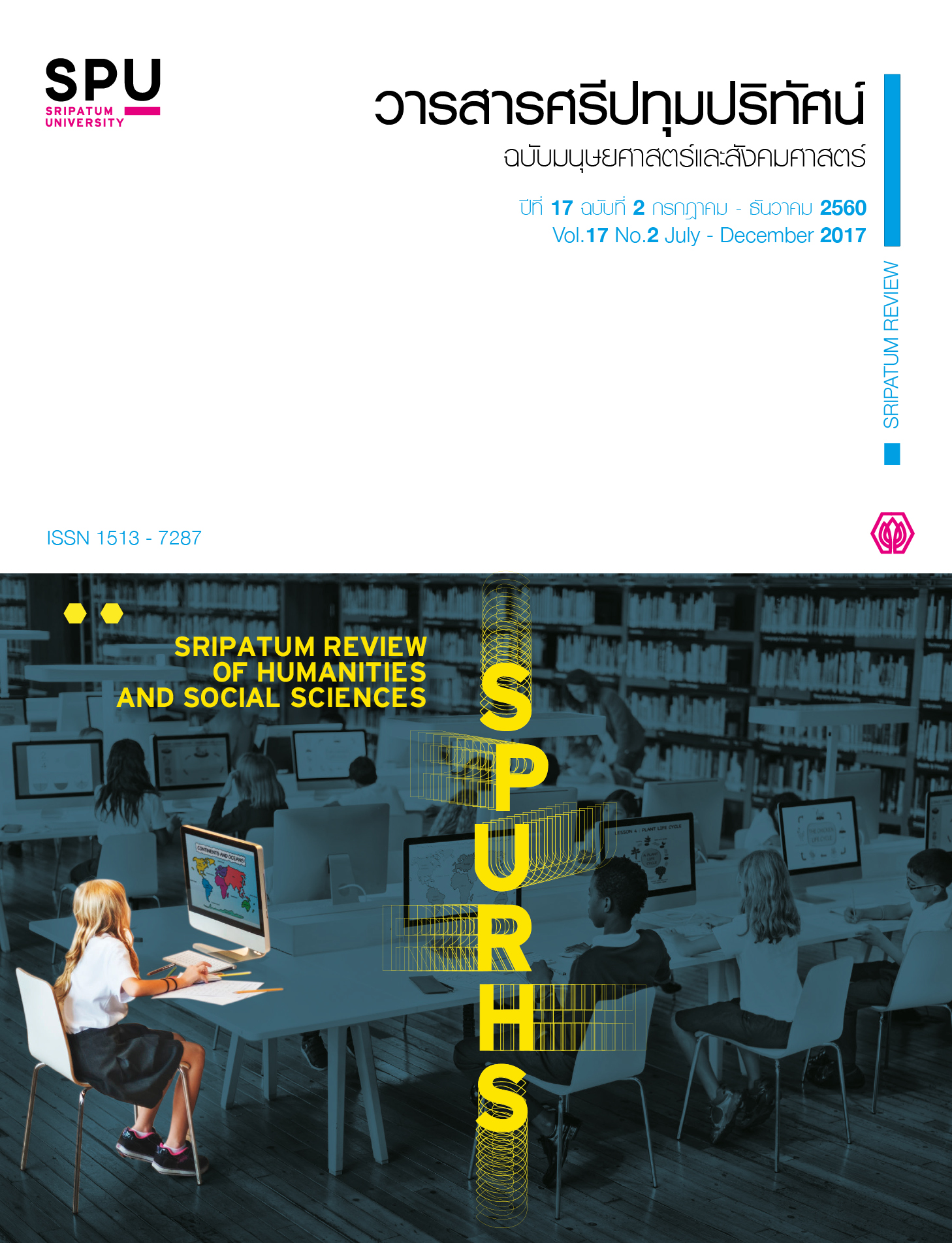A CAUSAL ADMINISTRATIVE FACTORS MODEL INFLUENCING ORDINARY NATIONAL EDUCATIONAL TEST SCORES OF STUDENTS IN PRIMARY EDUCATIONAL SERVICE AREA OFFICES IN THE EASTERN REGION
Main Article Content
Abstract
The objectives of this study were to (1) determine the administrative factors that influence the ordinary national educational test scores of students in schools under primary education service area offices in the Eastern region; (2) to develop and validate the concordance of the causal administrative factors model with empirical data; (3) to validate the feasibility of implementing the causal administrative factors model by the experts. The sample, derived by stratified random sampling, consisted of 720 academic teachers in primary schools under the primary education service area offices in the Eastern Region. The employed research instrument was a set of 5-scale rating questionnaire. Basic data were analyzed using descriptive statistics, while LISREL Program was used for verification of construct validity of the model. The feasibility of the model implementation was examined using focus group discussion by experts. The results indicated that the factors influencing ordinary national educational test scores of students in schools under primary education service area offices in the Eastern Region comprised instructional leadership, administrative behavior, teachers’ organizational commitment, being a learning organization of the school, and learner-centered instructional management. The factor having the highest overall influence was the instructional leadership. The factors that had direct influence were instructional leadership and teachers’ organizational commitment. They could be combined to predict students’ ordinary national educational test scores by 43 percent. The factors that had indirect influence were the administrative behavior, being a learning organization of the school, and learner-centered instructional management. The developed model conformed to empirical data at the good level. Also, the experts concluded that the model was appropriate and feasible for implementation.
Article Details
1. กองบรรณาธิการสงวนสิทธิ์ในการพิจารณาและตัดสินการตีพิมพ์บทความในวารสาร
2. บทความทุกเรื่องจะได้รับการตรวจสอบทางวิชาการโดยผู้ทรงคุณวุฒิ แต่ข้อความและเนื้อหาในบทความที่ตีพิมพ์เป็นความรับผิดชอบของผู้เขียนแต่เพียงผู้เดียว มิใช่ความคิดเห็นและความรับผิดชอบของมหาวิทยาลัยศรีปทุม
3. การคัดลอกอ้างอิงต้องดำเนินการตามการปฏิบัติในหมู่นักวิชาการโดยทั่วไป และสอดคล้องกับกฎหมายที่เกี่ยวข้อง
References
ดุจฤดี อ้วนคำ. 2553. “ความสัมพันธ์ระหว่างการรับรู้ความสามารถของครูกับผลสัมฤทธิ์ทางการเรียนระดับชาติของผู้เรียน ในโรงเรียนสังกัดสำนักงานเขตพื้นที่การศึกษาในจังหวัดเลย.” วิทยานิพนธ์ปริญญามหาบัณฑิต สาขาวิชาการบริหารการศึกษา บัณฑิตวิทยาลัย มหาวิทยาลัยราชภัฏเลย.
พรรณี เทพสูตร. 2556. “รูปแบบองค์กรแห่งการเรียนรู้ของโรงเรียนมัธยมศึกษา สำนักงานเขตพื้นที่การศึกษามัธยมศึกษาเขต 10 ที่พัฒนาองค์ความรู้ร่วมกับชุมชน.” วิทยานิพนธ์ปริญญาดุษฎีบัณฑิต สาขาวิจัยวัดผลและสถิติการศึกษา บัณฑิตวิทยาลัย มหาวิทยาลัยบูรพา.
พีระ เสมพืช. 2551. “การศึกษากระบวนการบริหารที่มีผลต่อผลสัมฤทธิ์ทางการเรียนที่ผ่านเกณฑ์ระดับชาติทุกกลุ่มประสบการณ์: กรณีศึกษาโรงเรียนอนุบาลพังงา.” วิทยานิพนธ์ปริญญามหาบัณฑิต สาขาวิชาการบริหารการศึกษา บัณฑิตวิทยาลัย มหาวิทยาลัยราชภัฏภูเก็ต.
วันดี สมมิตร. 2552. “ผลกระทบของการสอบระดับชาติขั้นพื้นฐานที่มีต่อพฤติกรรมการสอนของครูในเขตกรุงเทพมหานคร : การวิจัยแบบผสม.” วิทยานิพนธ์ปริญญามหาบัณฑิต สาขาวิจัยการศึกษา บัณฑิตวิทยาลัย จุฬาลงกรณ์มหาวิทยาลัย.
วิจารณ์ พานิช. 2555. วิถีการสร้างการเรียนรู้เพื่อศิษย์ในศตวรรษที่ 21. กรุงเทพฯ : ดิถาดาพลับลิเคชั่น.
สถาบันทดสอบทางการศึกษาแห่งชาติ. 2559. คะแนนผลการสอบของนักเรียน ชั้นประถมศึกษาปีที่ 6 สังกัดสำนักงาน เขตพื้นที่การศึกษาประถมศึกษา ภาคตะวันออก ตามบันทึกข้อตกลงว่าด้วยการขอใช้ประโยชน์จากผลคะแนนในการทดสอบทางการศึกษาระดับชาติขั้นพื้นฐาน. กรุงเทพฯ : สทศ.
สิทธิพร นิยมศรีสมศักดิ์. 2555. “การพัฒนา โรงเรียนให้เป็นองค์การแห่งการเรียนรู้.” วารสารวิทยบริการ 23, 1 : 17-30.
สุชีรา เลิศมณีรัตน์. 2557. “พฤติกรรมการบริหารของผู้บริหารสถานศึกษาที่ส่งผลต่อประสิทธิผลของการจัดการเรียนการสอนที่เน้นผู้เรียนเป็นสำคัญของโรงเรียนในสังกัดสำนักงานเขตพื้นที่การศึกษาประถมศึกษาปทุมธานี เขต 2.” วิทยานิพนธ์ปริญญามหาบัณฑิต สาขาเทคโนโลยี การบริหารการศึกษา บัณฑิตวิทยาลัย มหาวิทยาลัยเทคโนโลยีราชมงคลธัญบุรี.
สำนักงานเลขาธิการสภาการศึกษา กระทรวงศึกษาธิการ. 2552. ข้อเสนอการปฏิรูปการศึกษาในทศวรรษที่สอง (พ.ศ. 2552- 2561). กรุงเทพฯ : พริกหวานกราฟฟิค.
สำนักงานรับรองมาตรฐานและประเมินคุณภาพการศึกษา. 2554. คู่มือการประเมินคุณภาพภายนอกรอบสาม (พ.ศ. 2554- 2558) ระดับการศึกษาขั้นพื้นฐานฉบับสถานศึกษา พ.ศ. 2554. กรุงเทพฯ : สมศ.
Christensen, G.J. 1995. “The Role of the Principal in Transforming Accelerated Schools : A Study Using the Critical Incident Technique To Identify Behaviors of Principals.” Doctoral Dissertation : Stanford University.
Cotton F., and Ashley, B. 2003. Instructional leadership proficiencies of Elementary. Boston : Harvard Business school.
Creswell, J. W. 2013. Research Design : Qualitative, Quantitative and Mixed Methods Approaches. (2nd edition). Thousand Oaks, CA : Sage publications.
Diya Dou, Geert Devos and Martin Valcke. 2015. “Exploring the effects of principal leadership,School climate, teachers’ psychological factors on teachers’ job satisfaction and Organization commitment.” Social Sciences Gent University Journal Barcelona Spain 15 : 8113-8121.
Hair, J. et al. 2006. Multivariate Data Analysis. (6th edition) Upper Saddle River, NJ : Prentice-Hall.
Miller R.J., et al. 2010. Instructional Leadership: A Pathway to Teacher Collaboration and students’ Achievement. สืบค้นเมื่อวันที่ 18 สิงหาคม 2558. จาก https://pdfs.semanticScholar.org/1131
Prytula, M., Noonan, B., Hellsten, L. 2013. “Toward Instructional Leadership : Principals’Perceptions of Large – Scale Assessment in Schools.” Canadian Journal of Educational Administration and Policy 3,12 : 237-244.
Sarah Basu. 2016. “Professional Commitment and Job Satisfaction among Secondary School Teacher.” Journal of Education and Applied Social Sciences 7,3 : .255-259.
Senge, P. M. 1990. The fifth discipline : The art and practice of the learning Organization. New York : Doubleday.
Steers, R. M., Mowday, R. T., & Porter, L. W. 1979. “The measurement of Organizational commitment.” Journal of Vocational Behavior 14: 224-247.


